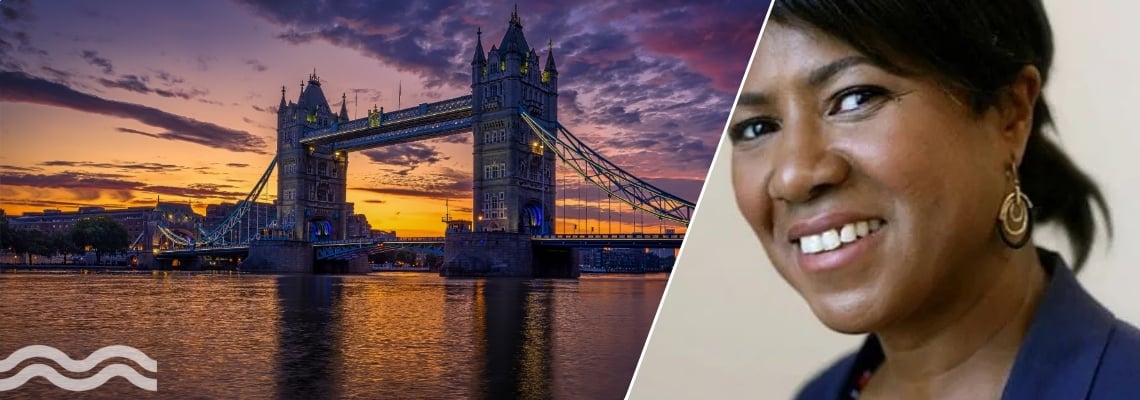Lila Thompson: Why we need supply communities
 Lila Thompson
Lila ThompsonAs British Water’s CEO since 2018, Lila Thompson is currently navigating the organisation through an extraordinary period of transition. In bringing together the UK water supply community and navigating the challenges brought about by Covid-19, Tom Freyberg asks: Is this the CEO’s biggest challenge yet?
Bringing it together
The UK’s water supply chain needs to be rephrased and seen as the supply community instead, states Lila Thompson.
By leading UK association British Water and indeed its community of members during the current Covid-19 pandemic, this could be seen as the biggest tests faced so far by the CEO since she took on the role, and it’s clear she has wasted no time in helping British Water adapt to the new landscape in which it finds itself.
At the start of the pandemic, and as part of its ‘Better Together’ campaign, the association started holding weekly videoconference calls.
Guests are invited to share their views, experiences and expertise on Covid-19 related issues and challenges, including changing project pipelines, health & safety, operations and finance.
Speakers have included Rachel Fletcher, Chief Executive of Regulator, Ofwat, as well as Dr Toby Willison, executive director of operations at the Environment Agency.
“As the proverb says: ‘There is wisdom in the counsel of many’,” says Thompson. “People matter more than anything else. Although we are separate, let’s not be disconnected.”
Speaking to Aquatech Online, Thompson said during the early calls in mid-March, the industry reported challenges centred around potential staff illness, absenteeism and also personal challenges, such as the provision of childcare and healthcare.
However, in recent calls the discussion has moved to predicting and navigating “cashflow challenges”, potential supply community interruptions and predicting when indeed business will return to normal.
Navigating a transition
A BSc graduate from Birkbeck, University of London, Thompson talks about the recent period of transition that has taken place at the association, even before the pandemic took hold in the UK.
“There has been a great period of transition,” she continues. “We've had internal staff changes; we're getting people in with expertise in different fields; we're doing lots of different exciting stuff.”
Such exciting projects included a member survey of over 200 clients, which resulted in “fantastic responses from our members” in terms of how they value the organisation.
Part of the feedback included 72 per cent of members, of whom 75 per cent are SMEs (small and medium sized enterprises), reporting that the association has helped them to secure new business.
The Chief Executive says she wants to help continue positioning the association as “a great place to come and collaborate and find innovations, technologies and solutions that meet the needs of the future”.
With the 2020-2025 asset management period (AMP7) requiring companies to work more innovatively, creatively and identify solutions to build resilience in the water and wastewater industries, Thompson says she wants to continue building stronger bridges between water utilities.
Testament to this aim was news of one of the largest utilities, Thames Water, which recently joined the association.
Scaling innovation - not for the faint-hearted
Prior to be becoming CEO at the end of 2018, Thompson was the international director of British Water for almost 13 years.
Arranging and accompanying SMEs on overseas trips, she witnessed which companies and solutions eventually secured business opportunities in some extremely challenging markets.
So what does she see as the common trait linking companies that succeed in scaling innovation and those that fall prey to the well-known ‘valley of death’?
“International trade is not for the faint-hearted,” she admits. “You see companies that are start-ups, but you really need to be a scale-up or a strong, highly experienced SME to go into international markets. Because once you receive the first order, then what are you going to do with it?”
As well as possessing the appetite for international trade, Thompson says patience is vital.
“You need a minimum of two to five years to invest in an international market before I think you can get a win.”
As well as highlighting the challenges in breaking into international markets, she also points out that the association helps companies wishing to enter the UK market, as it can be “really hard to get into the water companies”.
Dancing the digital tune
When looking across the UK utility landscape, she cites Northumbrian Water as a progressive example in digital, investing over £80 million over the last five years into digital.
“Northumbrian is bringing people along the digital journey,” she enthuses. “That’s the key part of how you digitalise an industry. You've got to put in place a culture of innovation, and an understanding of what digital looks like.”
She adds: “Digital can mean different things to different people. And then you've got to look at taking the people within that organisation on that journey. That can be a key blocker in terms of digital integration within companies.”
Thompson quotes Northumbrian Water Group’s CIO, Nigel Watson’s mantra of “You really need to have buy-in from the top down”, saying that from the CEO to the field operator level, there needs to be digital buy in.
Improving gender equality
As well as innovation and digitalisation, Thompson feels strongly about her role to help improve gender equality, beyond water and into science, technology, engineering and maths (STEM).
The organisation set the target of 30 per cent of its non-executive board to be female by 2025. So why only aim for 30 and not 50 per cent?
“Well, it's interesting because I've had some cheeky comments on social media about that,” she laughs.
“Really? 30 per cent? Two more women within five years? To me, I see it as a baseline figure – that’s the minimum and the start. The last female non-executive director we had on our board was in 2016, so it’s been a while.”
She adds: “Yes, we'd love to get 50 per cent or more, but it has to be that we, as an organisation are striving to drive change across the industry, so we're making a commitment and a start.”
Thompson says one of her aims is to find females, and people of black and minority ethnic backgrounds, who are not at a senior level, and “would never be considered to join a board”.
“We need to think differently in terms of our criteria and provide the necessary support so potential candidates can continue to build their confidence and join our board as part of a way to up-skill,” she says.
Leading a community
It’s clear that all CEOs, regardless of their organisation size, are currently entering uncharted territory when navigating through the current pandemic. Companies are having to adapt quickly to disrupted and distracted supply chains and workforces.
The experience Lila Thompson has gained from leading British Water’s international efforts for over a decade, connecting different cultures and solutions to challenges, will no doubt prove critical in the coming months.
If ever there was a need for a supply community, and not a supply chain to come together, it’s now.


